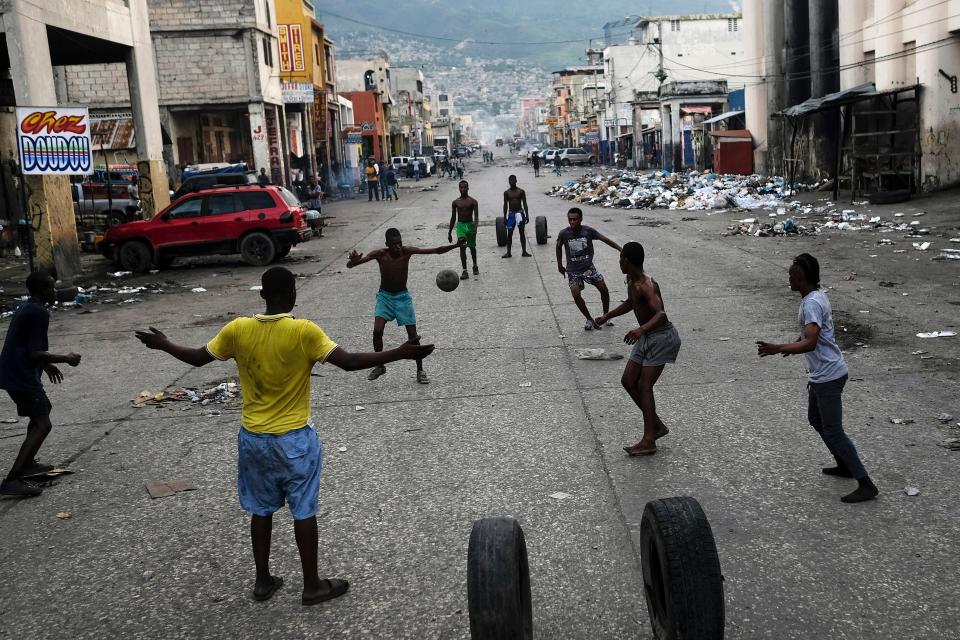Haitian gang reportedly seeks $17 million ransom for US missionaries and family members
A wide-ranging strike in protest of the abductions, violence and lawlessness consuming battered Haiti stretched into a second day Tuesday amid reports that a powerful gang was demanding a $17 million ransom for 16 Americans and a Canadian kidnapped three days ago.
The streets of Haiti’s capital, Port-au-Prince, were oddly quiet and largely empty Monday as the protest shuttered businesses, schools and public transportation. Unions and other groups vowed to continue the shutdown.
Striking taxi driver Jean-Louis Abaki said Prime Minister Ariel Henry and National Police Chief Léon Charles "have to give the population a chance at security" if they want to keep their jobs.
“We are calling on authorities to take action,” he said.
Bold criminal activity was rampant even before the July assassination of President Jovenel Moïse at his home. That crisis, along with an August earthquake that killed more than 2,200 and destroyed more than 130,000 homes, has fueled a near-total collapse of civil order.
The result has been gang rule, and abductions have become part of everyday life in Haiti. More than 300 kidnappings were reported to Haitian police in the first eight months of 2021. The overwhelming number of cases involved Haitians, and gaudy financial demands are often negotiated down to thousands of dollars – still a lot of money in a nation that by most metrics ranks as the poorest in the Western Hemisphere.
Haiti's turmoil reached the global spotlight Saturday when 17 people – seven women, five men, five children, all Americans except one Canadian – were seized in the community of Ganthier east of the capital. The group, with the Ohio-based Christian Aid Ministries, had just visited an orphanage.
FBI part of 'coordinated US government effort' to free missionaries
'We commit this situation to God': Holmes County missionaries kidnapped in Haiti
Brian Scheel oversees operations in Haiti for Americares, an international aid organization with about 40 people providing medical supplies and expertise there since a magnitude 7.2 earthquake devastated parts of the southern peninsula two months ago. Scheel says security issues in that region are markedly less dire than in and around the capital.
He said his team has strong relationships with Health Ministry officials and community leaders on the peninsula.
"Haiti has been in a heightened security situation for a number of months," he said. "But our staff on the southern peninsula feel safe. These are communities that we know extremely well."
Tracey Herstich, a professor of pediatrics and global health at Ohio's Walsh University, has been to the Caribbean country multiple times over the past decade. She says Haiti was "open and welcoming to people coming to help" in 2011. That has shifted with the increase in gang-related violence that has kept her away since 2018, she said.
"They are getting much bolder in taking foreigners. Gangs have even gone after hospital employees to try and get the hospitals to pay a ransom," she said. "They assume the hospital has money because it is not Haitian owned."
Saturday's kidnapping was the work of the 400 Mawozo gang, which controls the area where the attack took place, Haitian police say. The gang was also blamed for the kidnapping of five priests and two nuns in April. In that case, the gang initially demanded a $1 million ransom. All seven captives were released, but authorities did not say whether a ransom was paid.
Haitian Justice Minister Liszt Quitel told multiple news outlets including the Wall Street Journal that the gang has demanded $17 million for the missionary group's release – $1 million each. Quitel said the missionaries and their families – including children ages 8 months and 3, 6, 14 and 15 years – were being held in a safe house near where the kidnapping took place in a suburb of Port-au-Prince.
Quitel told the Journal that the FBI and Haitian police are in contact with the kidnappers but that negotiations could take weeks.
Alex Saint Surin, a popular Miami-based Haitian broadcaster, told the Miami Herald the only government the gangs fear is the U.S. government. The showdown over the Ohio-based missionaries will be crucial, he said.
"If the U.S. doesn’t do anything to get the missionaries out without paying a ransom, it will open the door for I don’t know how many kidnappings a day,” Saint Surin said. “There will be no exceptions, not even for diplomats. The U.S. will be giving a blank check to the gangs, saying ‘go ahead and do it every day.’”
The FBI has been working on the case with Haitian officials. U.S. State Department spokesman Ned Price said U.S. officials have been in constant contact with Haiti’s National Police, the missionary group and the victims’ relatives.
“This is something that we have treated with the utmost priority since Saturday,” he said, adding that officials are doing “all we can to seek a quick resolution to this.”
It was not immediately clear what impact Saturday's abductions will have on international aid efforts in Haiti.
"Most of us who are in the work of wanting to help in other countries are there because we want to bring awareness to their situation, and restore human dignity to the people that are living there," Herstich said. "You have to balance that with understanding the culture of where you're going in the context of the political climate.
Contributing: The Associated Press

This article originally appeared on USA TODAY: Haitian gang seeks $17 million ransom for US missionaries

 Yahoo Movies
Yahoo Movies 